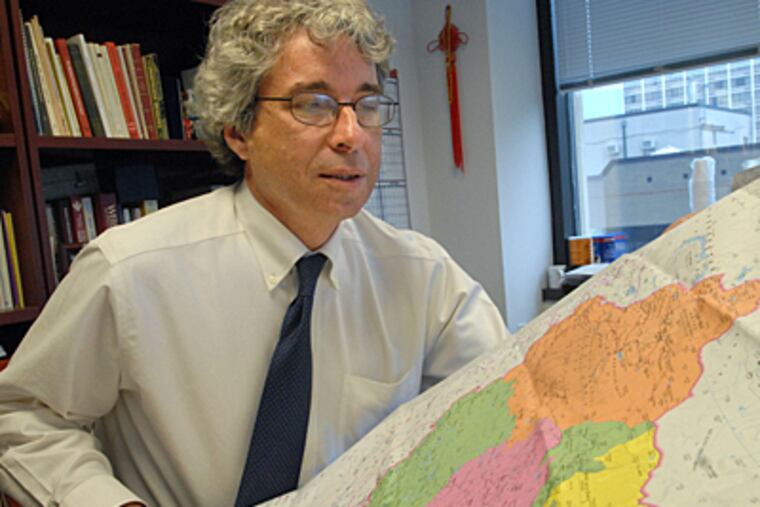Combating a dire China AIDS crisis
URUMQI, China - This month, as earthquakes roiled southern China, Penn researcher David Metzger left Philadelphia to deal with a health crisis in yet another part of China - a remote city on the edge of the Gobi Desert.

URUMQI, China - This month, as earthquakes roiled southern China, Penn researcher David Metzger left Philadelphia to deal with a health crisis in yet another part of China - a remote city on the edge of the Gobi Desert.
Metzger, who directs the HIV/AIDS Prevention Research Division at the University of Pennsylvania, is leading an effort to fight the rampant spread of AIDS in Xinjiang Province.
It's an epidemic largely affecting members of a group of poor Muslims of Turkic descent known as the Uyghurs (pronounced WEE-gers). Pushed to the fringes of Chinese society, many since the late 1980s have turned to using heroin.
About when the Olympic Games open in August, Metzger will start testing whether a drug that reduces the craving for heroin can also reduce the spread of HIV infection among addicts who share dirty needles.
"We have a moral obligation to be in places where drug use is driving the AIDs epidemic, and Western China is one of those areas," said Metzger, who in 2000 participated in a study of HIV among the Uyghurs, under a grant from the National Institutes of Health.
His team found that, among volunteers in Xinjiang's capital, Urumqi [Ur-UM-chi], the rate of new infections was 9 percent a year, the highest ever documented, Metzger said.
About 30 percent were already infected with HIV - also "among the highest rates of reported prevalence of HIV in injecting drug users in the world," Metzger said.
Philadelphia puts the number into perspective. Metzger said that among white injecting drug users here, HIV infection was less than 5 percent in 2006. Among Hispanic drug users, it was about 8 percent. And for African Americans, about 12 percent.
The drug trial in Urumqi, chaired by Metzger and funded by the NIH, will recruit about 500 opiate-dependent drug users who are not infected with HIV. They will be given Suboxone, which is seen as an improvement over the heroin detoxification drug, methadone.
Though more expensive than methadone, Suboxone is easier physiologically to withdraw from. The drug, given orally, also discourages abuse because, if injected, it causes painful side effects. Approved in 2002, the drug is offered in Philadelphia.
"If methadone isn't carefully monitored, people can overdose and die," Metzger said. Suboxone "is a safer medicine to prescribe."
Methadone, which has helped many overcome their craving for heroin, also led to the deaths of 4,462 people in the United States in 2005, according to federal data.
When Metzger first visited Urumqi in 2000, he was surprised that the Uyghur people appear more Western than Chinese and speak their own language, Uyghur.
Metzger was also struck by the geography. "It was like going out West in the U.S. with the mountains off in the distance."
He was not surprised, though, by their poverty and difficulty getting health care, jobs, education and housing.
"HIV in all regions of the world affects those who are most isolated from the mainstream community. That's why it's such an issue in the Uyghur community."
A look at Urumqi today reveals the tensions and contrasts between two very different cultures.
To capitalize on fertile agriculture, natural gas and oil in Xianjing Province, the Chinese government has encouraged members of the country's dominant ethnic group, the Han, to "Go West." They have arrived in massive numbers and are supplanting the Uyghurs, who populated Xinjiang for thousands of years.
Skyscrapers now tower above traditional mosques, where the imams' calls to prayer bring the hustle of open-air markets to a halt. Posh restaurants, with celebrity photos on the walls, are rising next to old stands selling pilaf and mutton kebabs.
Street signs today are mostly written in Chinese characters, with Uyghur in a much smaller font at the bottom.
The Uyghurs tend to hold the least desirable jobs and live in the worst parts of Urumqi, even as the city, like much of China, booms.
Workers are also flocking to Xinjiang, seeking jobs on its fertile farms. Poor and uneducated, these workers can pick up the virus in the region's brothels, often fronted as massage parlors and hair salons. They then can infect others when they return to their hometowns.
The Chinese government has acknowledged the growing AIDS problem in Xinjiang Province. Nationally, its Center for Disease Control and Prevention has set up the world's largest methadone outreach program. The government is also offering clean needle exchanges and subsidizing detoxification drugs and rehabilitation programs.
Xiaoxing Fu, an anthropologist from Renmin University in Beijing, is an expert on injection drug abuse in China and the Uyghur minority. Heroin, he said, moves into Xinjiang from Afghanistan, and from the "Golden Triangle," a poppy-growing area that includes Myanmar, Laos and Thailand.
"Uyghurs have a custom of sharing good things," including dirty needles, Fu said, adding that poverty might also play a role.
Injecting drug users "are often stigmatized as liars, thieves, cheaters and criminals," he said. "Sometimes, only the health-care providers care about them."
Metzger is hopeful his trial can make a difference. "If we can show that the use of this medicine, during a one-year treatment program, reduces risk behaviors and has a sustained effect on reducing HIV infection, that is our goal."